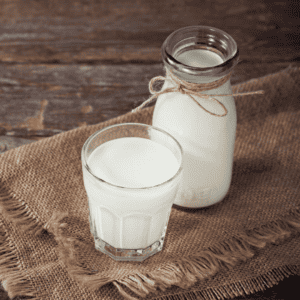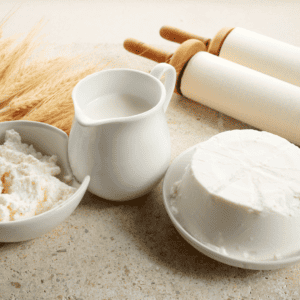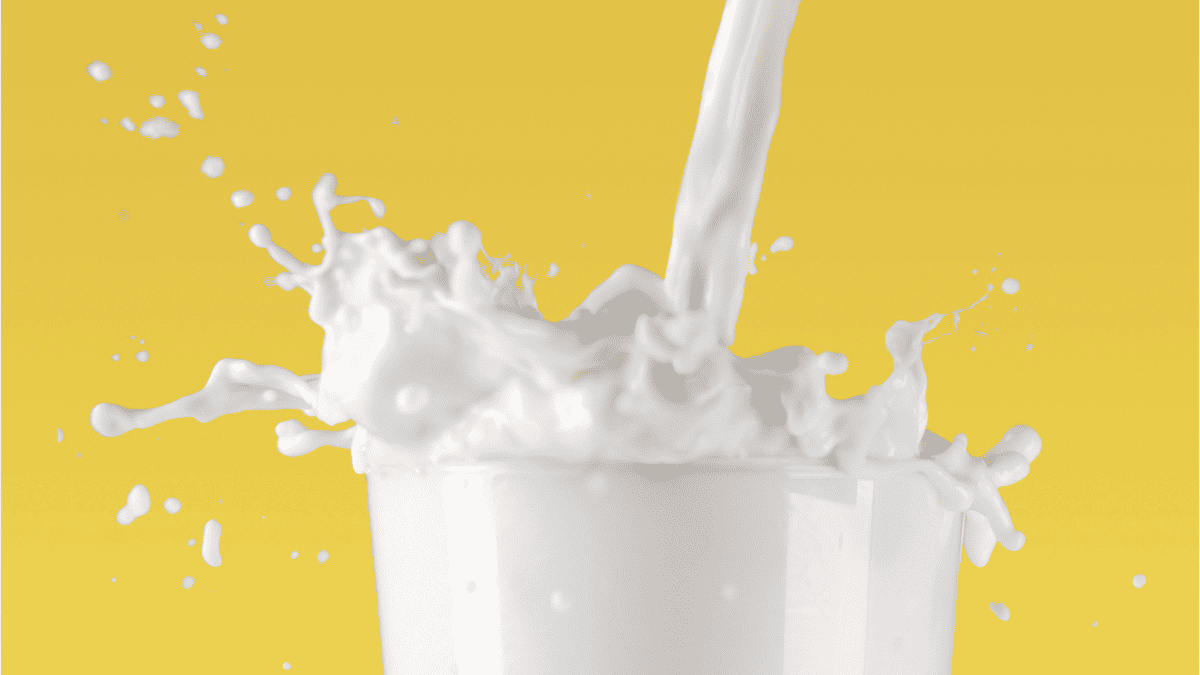Milk has played a significant role in human culture for thousands of years, with a rich history in the Bible and a lasting impact on our diets and daily lives. From its symbolic and spiritual significance to its numerous health benefits, milk has much to offer. Join us as we explore the fascinating history of milk in the Bible, its role in Jewish culture, and its impact on our health and well-being. Discover the enduring legacy of this remarkable substance and its importance in our lives today.
Milk in the Old Testament:

Milk is a recurring theme in the Old Testament, with various references to its symbolism and significance. In the Creation story, milk is used as a symbol of abundance and nourishment, representing God’s provision for Adam and Eve.
Later in the book of Exodus, the Israelites are promised a land flowing with milk and honey, indicating that it would be a place of prosperity and richness. Milk is also mentioned in the story of Abraham and the three angels, where Abraham offers them milk to drink, symbolizing hospitality and generosity.
In the story of Joseph and his brothers, milk is given as a gift to show kindness and reconciliation. This act of giving milk represented a gesture of goodwill and hope for future peace between the brothers.
Additionally, milk was used as a component of sacrificial offerings, symbolizing purity and sacrifice. In Leviticus, it is written that the Israelites were to offer milk as part of the ritual offerings to God. The use of milk in these offerings represented the idea of pure and unblemished sacrifice.
Overall, milk in the Bible plays a significant role in the Old Testament as a symbol of God’s provision, generosity, and purity. It serves as a reminder of the abundance that God has promised and the importance of living a pure and sacrificial life.
Milk in the New Testament:

Milk takes on a new significance in the New Testament, where it is used as a metaphor for spiritual growth and nourishment. In 1 Peter 2:2, the author urges believers to “long for the pure spiritual milk, that by it you may grow up into salvation.” Here, milk represents the Word of God, which is essential for believers to grow in their faith and become mature in their understanding of God’s will.
The Gospel of Matthew also uses milk as a symbol of righteousness. In the Sermon on the Mount, Jesus says, “Blessed are those who hunger and thirst for righteousness, for they shall be satisfied” (Matthew 5:6). This hunger and thirst for righteousness is compared to a desire for milk, which satisfies and nourishes the body. This comparison emphasizes the importance of righteousness in the life of a believer and the satisfaction that comes from living a righteous life.
In the Gospel of John, Jesus is referred to as the “milk” that nourishes and sustains believers. In John 6:35, Jesus says, “I am the bread of life; whoever comes to me shall not hunger, and whoever believes in me shall never thirst.” This statement emphasizes Jesus’ role as the source of nourishment and sustenance for believers, providing the spiritual milk they need to grow in their faith and have eternal life.
Overall, the use of milk in the New Testament emphasizes the importance of spiritual growth and nourishment, as well as the significance of righteousness and the role of Jesus as the source of spiritual nourishment. These metaphors continue to have relevance and significance in the lives of believers today, reminding us of the importance of staying grounded in our faith and relying on God’s provision for our spiritual needs.
Milk in Jewish Culture:

Milk plays a significant role in Jewish culture, both as a symbol of purity and abundance and as a staple food. According to Jewish dietary laws, milk and meat products cannot be consumed or cooked together, meaning that milk must be certified kosher. This certification ensures that the milk comes from a kosher animal and does not contain any non-kosher ingredients.
Kosher milk is produced under strict guidelines and is subject to rigorous inspection to ensure that it meets all the requirements for certification. It is typically produced from cows, goats, or sheep that are raised in accordance with kosher standards and are treated humanely.
In addition to being consumed as a beverage or used in cooking, kosher milk is also used in a variety of traditional Jewish dishes and desserts. For example, blintzes, cheesecake, and rugelach are made with kosher milk products. Milk also plays a special role in the Jewish tradition of the Passover Seder, where it is one of the four traditional cups of wine or grape juice.
Overall, milk’s importance in Jewish culture extends beyond its nutritional value, representing adherence to Jewish dietary laws and tradition. Its symbolism and cultural significance make it an essential part of Jewish cuisine and ritual.
Health Benefits of Milk

Milk is a nutrient-rich beverage that provides numerous health benefits. It’s an excellent source of calcium, protein, vitamin D, vitamin B12, and potassium. These essential nutrients are important for maintaining strong bones, building and repairing tissues in the body, regulating blood pressure, and supporting the nervous system and brain function.
In addition, milk can reduce the risk of chronic diseases, such as heart disease, stroke, and type 2 diabetes. The nutrients in milk have been shown to help lower blood pressure, reduce inflammation, and improve insulin sensitivity. Drinking milk regularly can also improve mood and reduce stress and anxiety, thanks to its tryptophan content.
While milk has many health benefits, it may not be suitable for everyone. Some people may be lactose intolerant, meaning they cannot digest lactose, the sugar found in milk. For these individuals, there are lactose-free milk alternatives available, such as soy milk, almond milk, or oat milk.
It’s important to note that not all milk is created equal. Organic milk, for example, comes from cows that are not treated with antibiotics or growth hormones and are fed organic feed. This makes it a healthier choice for those concerned about the potential health risks associated with conventional milk.
Milk is a nutrient-rich beverage that provides numerous health benefits. Its essential nutrients, ability to reduce the risk of chronic diseases, and mood-improving effects make it a valuable addition to any diet. However, individuals who are lactose intolerant or have other dietary restrictions should opt for milk alternatives.
Milk in Modern Times:

Milk has been a staple food for humans since the dawn of civilization. In modern times, milk continues to be an important part of many people’s diets and cultures around the world. However, the consumption of milk has become a topic of controversy and debate in recent years.
Many people have turned to plant-based milk alternatives, such as soy, almond, and oat milk, due to concerns about lactose intolerance, animal welfare, and environmental sustainability. These plant-based alternatives offer many of the same nutritional benefits as dairy milk and are often fortified with additional vitamins and minerals.
Despite this trend, dairy milk remains a popular choice for many people. It is a rich source of calcium, protein, and other important nutrients, and it has been shown to reduce the risk of chronic diseases such as heart disease, stroke, and type 2 diabetes.
In addition to its nutritional benefits, milk continues to be an important part of many cultures and traditions around the world. Milk is often used in religious ceremonies and rituals, and it is viewed as a symbol of abundance and prosperity in many cultures.
Overall, milk remains a significant and valuable part of human culture and nutrition in modern times. While the debate over the consumption of dairy milk continues, the enduring legacy of milk and its importance in our lives cannot be denied.
Milk in the Bible Conclusion:
Milk, a simple and basic food source, has been an integral part of human life since the beginning of time. From the Creation story to modern times, milk has played a significant role in culture, religion, and diet. Its symbolism of abundance, nourishment, and purity is evident in both the Old and New Testaments. Additionally, milk’s nutritional benefits have been recognized for centuries, and its health benefits are backed by science. Despite growing interest in plant-based alternatives, milk remains a beloved and valuable part of our lives. As we continue to discover new uses and benefits for milk, its importance in human life is likely to remain unchanged.

